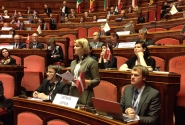
“This is a year of radical challenges; one can even say that this is the “moment of truth” for the Neighbourhood Policy of the European Union. It is a reality that cannot be ignored, and it must be the point of departure for any analysis of the state of play and future vision of the EU’s foreign policy,” said Lolita Čigāne, Chairperson of the European Affairs Committee, on Tuesday, 2 December, at the LII COSAC held in Rome during the Italian Presidency of the Council of the European Union.
“Military expansion of Islamic fundamentalists in Iraq, Syria and Libya, as well as Russia’s blatant aggression in Ukraine, significantly destabilised the EU’s southern and eastern regions. These regional “tectonic” geopolitical changes, in both cases made by forces that have no respect for fundamental European values of the rule of law and various freedoms, now pose a potential threat to the EU’s own territory, economy and integrity,” emphasised the Chairperson and rhetorically asked the audience whether we can deal with them by revaluating or perhaps even reforming our current regional cooperation policy instruments: the Union for the Mediterranean and the Eastern Partnership. Lolita Čigāne indicated that this will be one of the priorities of the upcoming Latvian Presidency in the Council of the European Union.
The Chairperson of the European Affairs Committee admitted that she has deliberately put the EU’s two foreign policy directions, namely, the Middle East and North Africa, on the one hand, and Eastern Europe, on the other hand, close together because only the EU's ability to deal with both of them will give the much-desired global credibility to the foreign policy of a united Europe. “These regional policies must not oppose each other in official statements, in the behind-the-scenes bargaining processes or in battles for funding,” emphasised Chairperson Čigāne.
With regard to the Eastern Partnership, which is planned to be reviewed during the Latvian Presidency, the Chairperson of the European Affairs Committee expressed conviction that the reviewed Eastern Partnership must convey a clear political message that after Ukraine, Moldova and Georgia have completed all the required democratic reforms and have ensured compliance with the set criteria, they will have an opportunity to start EU accession negotiations. “A clear prospect of accession would be the best motivation for undertaking serious reforms in the Partnership countries,” said Čigāne acknowledging that the reform process might take decades.
The Eastern Partnership Summit in Riga will also focus on building relations with Russia. “As a representative of a country with a long history of Soviet occupation, I would like to point out that before restarting EU’s relations with Russia, the latter has to radically change its behaviour. Russia must respect the sovereignty and total territorial integrity of Ukraine in order to give the EU a reason for lifting the majority of sanctions,” said the Chairperson. “More important, Russia has to fully recognise the European choice of the Ukrainian, Georgian and Moldovan people.”
Concurrently, Lolita Čigāne expressed regret that Russia is showing no signs of willingness to de-escalate the conflict and that its troops are still present in the country to the east of the EU border.
In conclusion, the Chairperson of the European Affairs Committee expressed her belief that EU’s solidarity and ability to find a solution in even the most difficult situations will continue to be the major driving force of European integration. She also took the opportunity to invite her European counterparts to attend the inter-parliamentary meetings of the Latvian Presidency.
Saeima Press Service







